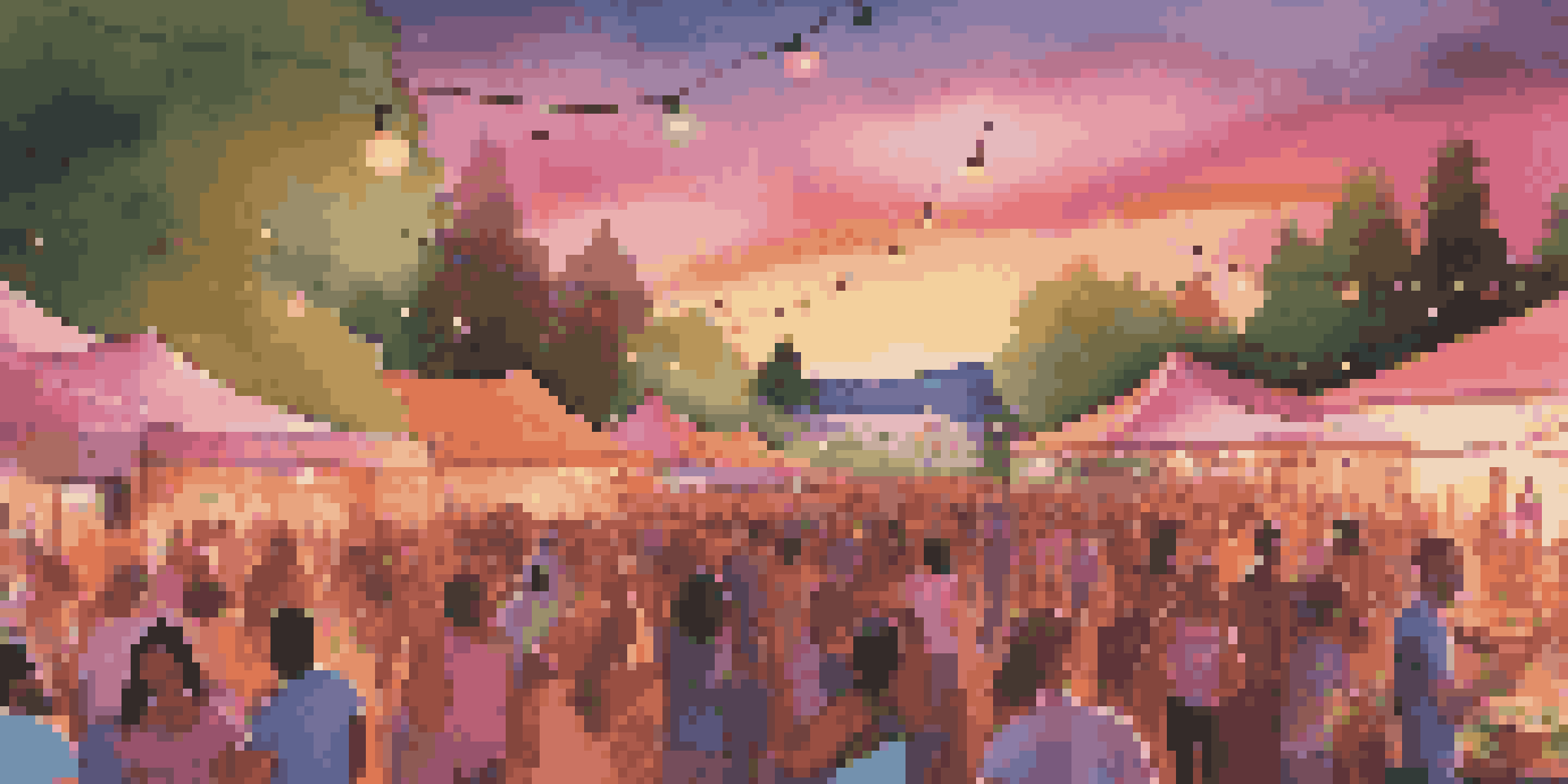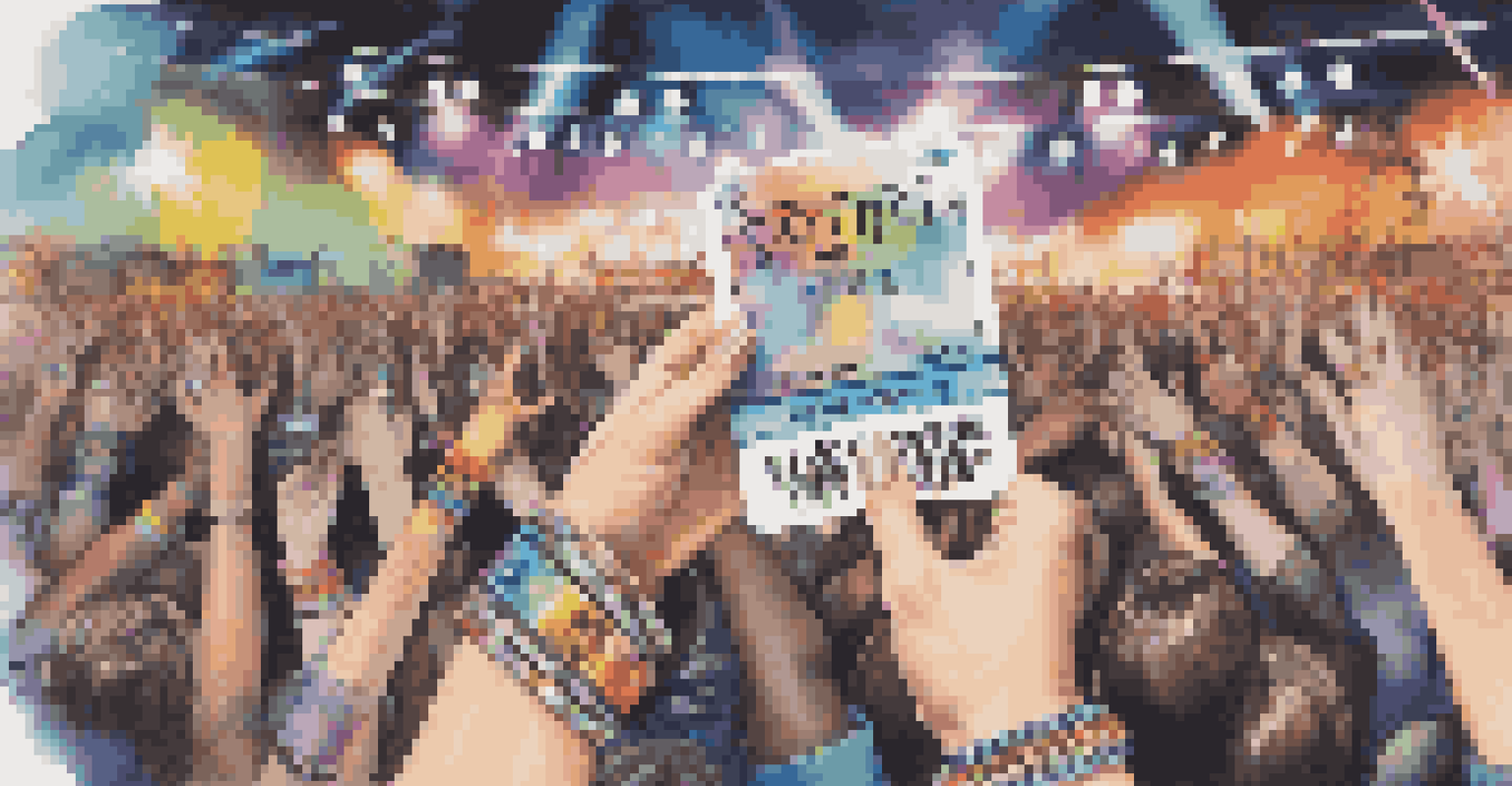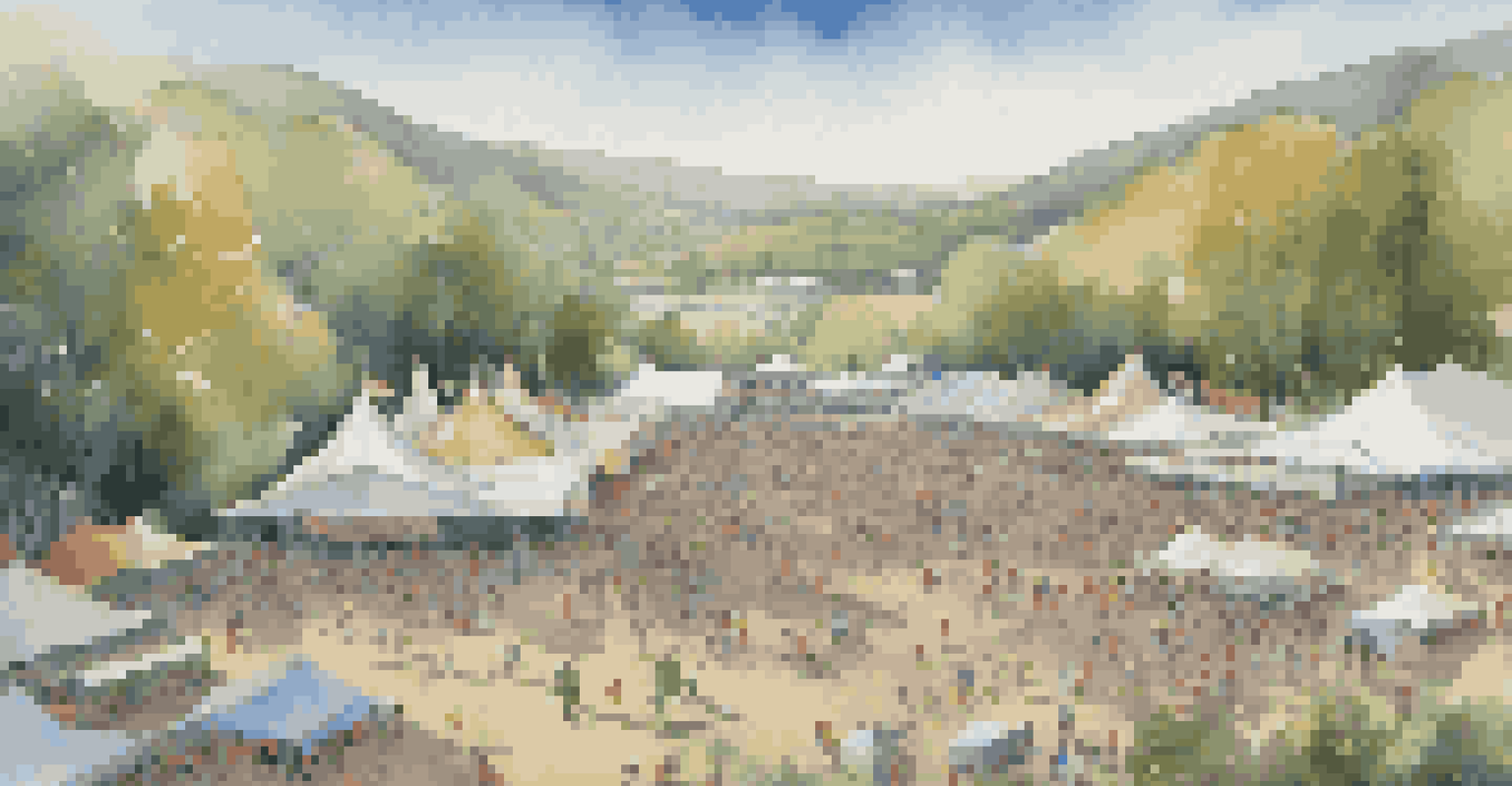The Sociology of Music Festivals and Community Building

Understanding Music Festivals as Social Spaces
Music festivals serve as vibrant social spaces where individuals gather, celebrate, and connect. They provide an opportunity for people to immerse themselves in a shared experience, often transcending cultural and geographical barriers. For many, these events are more than just concerts; they are a place to forge friendships and create lasting memories.
Music is the shorthand of emotion.
The unique atmosphere of a festival fosters interactions that might not occur in everyday life. Imagine finding common ground with a stranger over a shared favorite band or dance move. These spontaneous connections highlight the festival's role as a melting pot of diverse communities, where acceptance and camaraderie flourish.
Moreover, festivals often attract individuals from various backgrounds, contributing to a rich tapestry of experiences. This diversity not only enhances the festival ambiance but also encourages attendees to embrace different perspectives, ultimately promoting social cohesion.
The Role of Music in Building Community Identity
Music plays a crucial role in shaping community identity at festivals. Different genres can represent specific cultural backgrounds or social movements, uniting attendees under a common banner. For instance, a reggae festival may evoke feelings of peace and unity, while a rock festival might channel rebellion and freedom.

As people gather to celebrate their favorite genres, they often find a sense of belonging and pride in their shared musical tastes. This shared experience can strengthen community bonds, creating a collective identity that attendees proudly carry beyond the festival grounds.
Festivals Foster Community Connections
Music festivals create vibrant social spaces where diverse individuals can connect, celebrate, and forge lasting friendships.
In essence, music acts as a catalyst for connection, giving voice to the values and emotions of a community. As individuals resonate with the lyrics and rhythms, they weave their personal stories into the larger narrative of the festival, enriching the overall experience.
Creating Safe Spaces for Expression and Acceptance
One of the most significant aspects of music festivals is their ability to create safe spaces for self-expression. Attendees often feel liberated to express their individuality through fashion, dance, and art. This freedom encourages creativity and authenticity, allowing people to shed societal constraints and embrace their true selves.
The beautiful thing about music is that it transcends language.
Festivals also promote inclusivity, often making concerted efforts to welcome marginalized groups. By providing a platform for diverse voices and perspectives, these events foster an environment where acceptance reigns. This sense of belonging is vital for individuals who may feel alienated in other aspects of life.
Ultimately, the safe spaces cultivated at music festivals contribute to personal growth and community resilience. When people feel accepted and valued, they are more likely to engage positively with others and contribute to the collective well-being of the community.
The Impact of Festivals on Local Communities
Music festivals can significantly impact the local economy, attracting visitors and boosting tourism. From hotels to restaurants, local businesses often see a spike in revenue during festival weekends. This influx creates job opportunities and fosters economic growth, benefiting the community as a whole.
Beyond financial benefits, festivals also enhance community pride. Residents often take pride in hosting large-scale events, showcasing their culture and hospitality to visitors. This pride can lead to increased civic engagement, as locals become more invested in the success and sustainability of future festivals.
Music Shapes Community Identity
Different musical genres at festivals unite attendees, strengthening their sense of belonging and community pride.
Moreover, festivals can catalyze community projects and collaborations. Local artists, vendors, and organizations often come together to create unique experiences, fostering a sense of unity and collaboration that extends beyond the festival itself.
Environmental and Social Responsibility at Festivals
In recent years, many music festivals have embraced environmental and social responsibility, reflecting the values of their attendees. Initiatives like waste reduction, recycling programs, and sustainable sourcing are becoming standard practices. These efforts not only minimize the ecological footprint but also educate attendees on the importance of sustainability.
Additionally, festivals are increasingly recognizing their role in addressing social issues. Many events partner with non-profits to raise awareness and funds for causes such as mental health, social justice, and environmental conservation. This alignment with social responsibility resonates deeply with attendees, enhancing their sense of purpose during the festival.
By prioritizing these initiatives, festivals contribute positively to their communities, fostering a culture of awareness and responsibility. Attendees leave not only with unforgettable memories but also a heightened sense of their role in creating a better world.
The Evolution of Music Festivals Over the Years
Music festivals have evolved significantly since their inception, reflecting changing societal norms and technological advancements. From the iconic Woodstock in 1969 to today's multi-genre festivals, the landscape has transformed, embracing diversity and innovation. This evolution mirrors broader cultural shifts, highlighting the importance of music as a tool for social commentary and connection.
With the rise of social media, festivals now have a global reach, allowing attendees to share their experiences in real-time. This connectivity creates a sense of community that extends beyond physical boundaries, enabling fans from all over the world to engage with each other. The shared content fosters a collective narrative that enhances the festival experience.
Festivals Promote Social Responsibility
Many music festivals now focus on sustainability and social issues, encouraging attendees to engage in meaningful causes.
As festivals continue to adapt to the changing landscape, they remain a vital part of our cultural fabric. They not only provide entertainment but also serve as a platform for dialogue, activism, and community building, ensuring their relevance for future generations.
The Future of Music Festivals and Community Engagement
Looking ahead, the future of music festivals is likely to be shaped by emerging trends and shifting societal values. As communities become more engaged in social issues, festivals may increasingly focus on themes of activism and empowerment. This shift could lead to a deeper connection between music and meaningful change, reinforcing the festival's role as a catalyst for community engagement.
Technology will also play a significant role in shaping future festivals. Innovations such as virtual reality and live streaming will create new ways for people to experience music festivals, expanding accessibility for those who cannot attend in person. This technological integration could further enhance community connections, allowing fans to engage with each other across distances.

Ultimately, the future of music festivals lies in their ability to adapt and resonate with the values of their attendees. By fostering connections, promoting inclusivity, and championing social responsibility, festivals can continue to be powerful agents of community building for years to come.